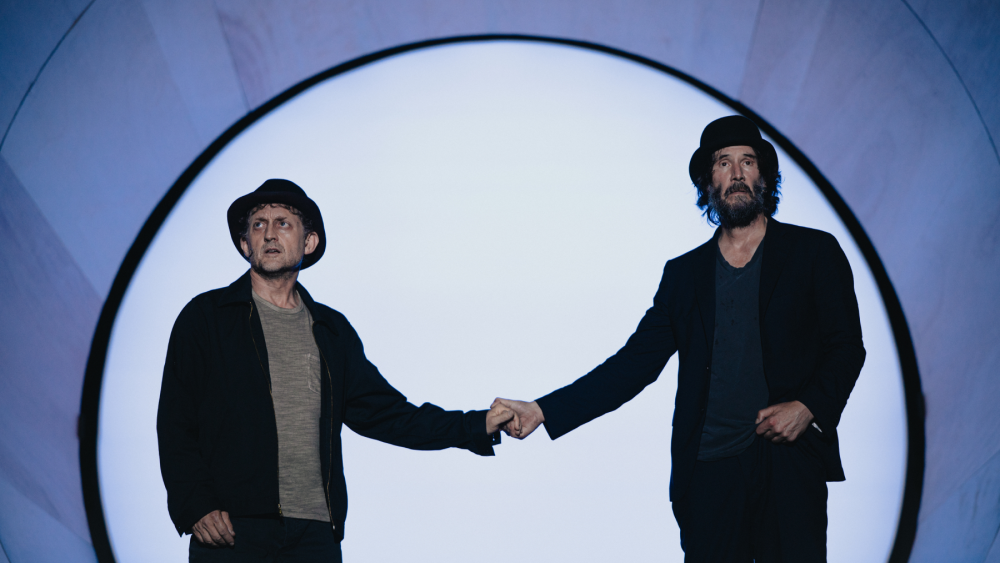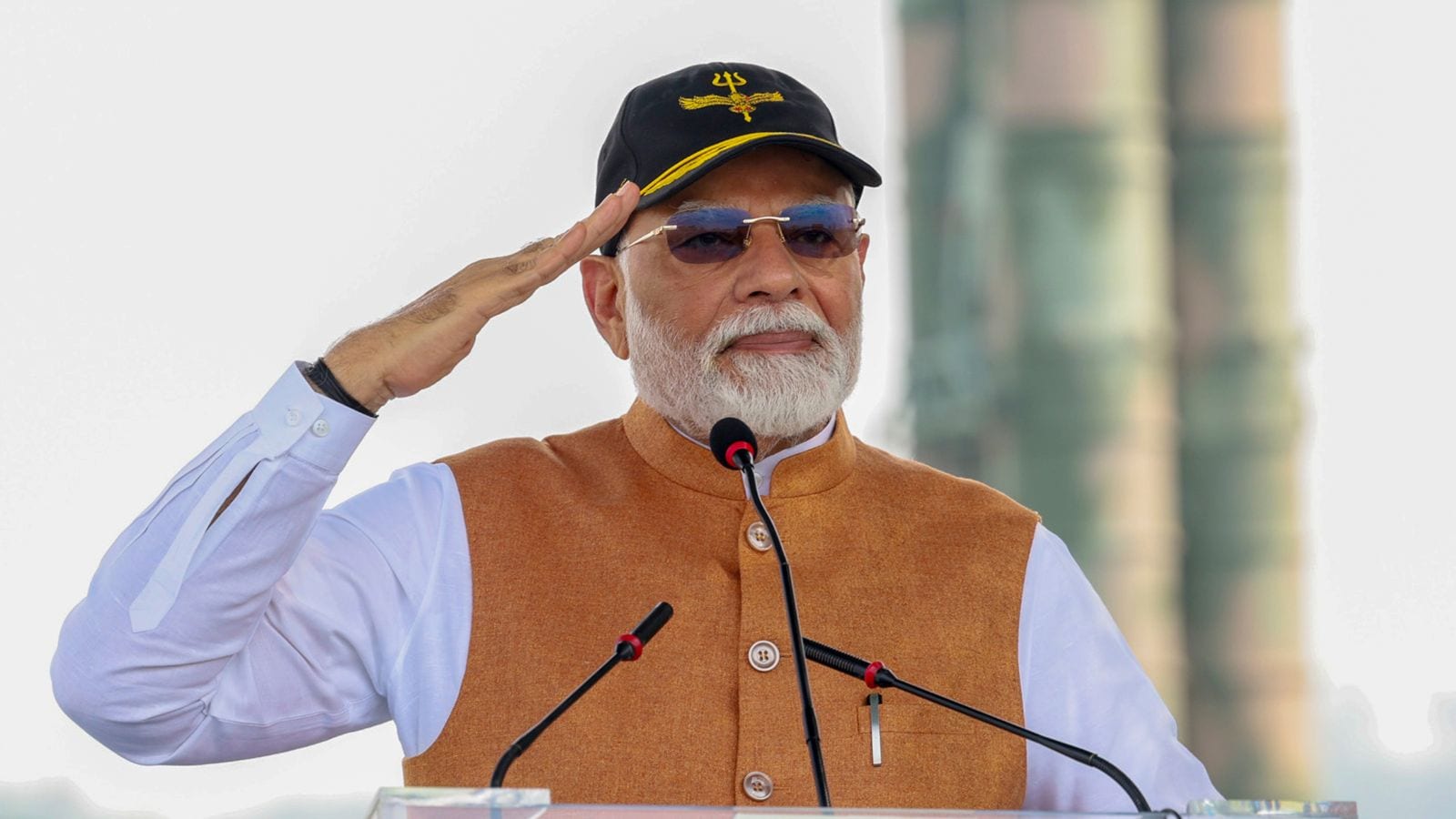
Forget the tree.
That iconic lone tree from the stage directions in Samuel Beckett’s tragicomic masterwork “Waiting for Godot” is offstage in Jamie Lloyd’s re-envisioned revival. The polarizing British director who has placed his conceptual stamp on “A Doll’s House,” “Sunset Boulevard” and “Evita,” again challenges the norms in his latest production, taking on the master of ambiguity, absurdity and minimalism — but with mixed results.
Though Lloyd supplants Beckett’s bleak and barren setting with something brighter, cleaner and cosmic — but minus any “Sunset Boulevard”-style video flourishes this go-round — the play’s existential angst in an irrational world remains as powerful as ever — and perhaps more attractive to new audiences due to the casting.
This New York revival is driven by the star power of Keanu Reeves (of the “The Matrix” and “John Wick” film series), who is making a respectable Broadway bow. Joining him in this earnest project as Beckett’s Sisyphean vagabonds is Reeves’ longtime bud, Alex Winter, his goofball bro from the loopy time-traveling “Bill & Ted’s Excellent Adventure” films which began in 1989 (the year of Beckett’s death).
This return match-up (“Together again at last!”) has turned the playwright’s vaudevillian clowns into comics of a cooler sort. If not stoner dudes — they are, after all, both 60ish now — they’re more like go-with-the-flow buds with their own relaxed rhythms, encircling speech patterns and genuine bond. Though the two actors have a kind of slacker ease in the nonsensical volleys, this lower temperature approach too often misses the work’s humor, horror and emotional resonance.
With scraggly hair and beard and a dazed countenance of man waking up from an unspeakable dream, Reeves brings the tender vulnerability to his Estrogen (aka Gogo). Sometimes with his arms tightly folded in full pout or for protection, sometimes in a fearful fetal position as if protecting himself from the unknown, he’s a man-child lost in time, space and memory. But the sense of the poet that Gogo once was is absent here — and Gogo needs to be a soul worth saving.
However, Winter’s unbowed Vladimir (aka Didi) is. He’s clearly the driver here as the duo patiently and impatiently wait for the mysterious Godot to arrive. Didi considers his tasks to be: staying the course, keeping the faith, buoying his buddy, and clinging to hope, despite a hopeless loop of disappointments and deferrals.
Winter’s face has the weathered look of a person whose struggles for survival in a cruel and violent world have taken its toll. In the end his Didi hangs by a thread as he movingly faces the void, realizing that taking it one day at a time is a life sentence he can barely endure and yet he does.
And about that void: Beckett’s country road is replaced here with a giant spiral structure that encompasses the stage, designed by Soutra Gilmour. It’s a stunning and glistening setting — perhaps it’s an ivory pipeline to the universe or maybe the eye of God or whatever one projects. Though shocking at first sight for this play’s familiar landscape, it also feels thematically fitting.
Jon Clark’s no-place-to-hide lighting unnervingly brightens Beckett’s shadowy world but without losing its sense of dread, allowing both light and dark at the end of this infinite tunnel. The actors also make great physical use of the epic curvature, comically sliding, slipping and cradling themselves to sleep though they’re more often than not swallowed up in the setting that severely limits the playing field.
Breaking into the duo’s static world are Brandon J. Dirden as the pompous interloper Pozzo and Michael Patrick Thornton as his almost-silent, strangely masked slave Lucky. Dirden brings many colors to the indulgent bombast of this self-centered sociopath, his fascistic brutality disguised as hollow civility. He’s repellent but Dirden makes it so we can’t take our eyes off him.
But Lloyd’s awkward staging here and questionable affectations (including an audience clap-along) makes Pozzo’s relationship with Lucky unfocused and puzzling. Beckett’s symbols of master and slave — the whip, the rope, the servant weighed down with baggage — are either mimed or cut and in doing so lose its real horror.
Thornton uses a wheelchair, and here his Lucky is guided by his tormentor. But the character’s state of servitude is largely hidden in clumsy blocking. Thornton, however, is magnificent in Lucky’s epic “thinking” tirade, a babbling aria with its own inner logic.
Zaynn Arora as the boy messenger (Eric Williams in alternate performances) who delivers the news of Godot’s postponement is suitably fragile, fearful and haunting.
One might also wonder what Beckett — whose strict oversight of productions was legendary — would make of Reeves and Winter’s air-guitar riff, echoing the duo’s signature stance from their film partnership. (Robin Williams also tossed pop-culture references into a 1988 production in which he was paired with Steve Martin.) Certainly many in the audience love it. Purists not so much — but this production is clearly not meant for them.
Still, as a resigned Didi says, “the essential doesn’t change.” Whether on stages in post-war Europe, a hall in San Quentin, or on a pandemic Zoom, Beckett’s wandering refugees and their desperate need to be seen as they search for meaning, purpose and hope continue to find fresh relevance. In the current dystopia, this evergreen play and provocative production may just be worth the wait.



